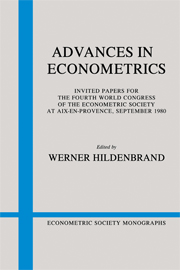Book contents
- Frontmatter
- 1 Qualitative response models
- 2 The identification problem in econometric models for duration data
- 3 The effects of time in economic experiments
- 4 Some recent developments on the distributions of single-equation estimators
- 5 Best uniform and modified Padé approximants to probability densities in econometrics
- 6 Identifiability and problems of model selection in econometrics
- 7 Causality, exogeneity, and inference
- 8 Generating mechanisms, models, and causality
- 9 Comparing alternative asymptotically equivalent tests
- 10 Conflict among testing procedures in a linear regression model with lagged dependent variables
- 11 Macroeconomic modeling based on econometric and simulation models for the Polish economy
5 - Best uniform and modified Padé approximants to probability densities in econometrics
Published online by Cambridge University Press: 05 January 2013
- Frontmatter
- 1 Qualitative response models
- 2 The identification problem in econometric models for duration data
- 3 The effects of time in economic experiments
- 4 Some recent developments on the distributions of single-equation estimators
- 5 Best uniform and modified Padé approximants to probability densities in econometrics
- 6 Identifiability and problems of model selection in econometrics
- 7 Causality, exogeneity, and inference
- 8 Generating mechanisms, models, and causality
- 9 Comparing alternative asymptotically equivalent tests
- 10 Conflict among testing procedures in a linear regression model with lagged dependent variables
- 11 Macroeconomic modeling based on econometric and simulation models for the Polish economy
Summary
In this chapter, a new method of approximating the probability density functions (pdf's) of econometric estimators and test statistics is developed. It is shown that best uniform approximants to a general class of pdf's exist in the form of rational functions. A procedure for extracting the approximants is devised, based on modifying multiple-point Padé approximants to the distribution. The new approximation technique is very general and should be widely applicable in mathematical statistics and econometrics. It has the advantage, unlike the Edgeworth and saddlepoint approximations, of readily incorporating extraneous information on the distribution, even qualitative information. The new procedure is applied to a simple simultaneous-equations estimator, and it gives exceptionally accurate results even for tiny values of the concentration parameter.
Introduction
The idea of approximating small sample distributions, rather than extracting their exact mathematical forms, has a long history in statistics, and a number of different techniques have been explored. Kendall and Stuart (1969) gave an introductory survey of some of these techniques in their Chapters 6, 12, and 13. Approximations are clearly of importance in those cases in which mathematical difficulties have prevented the development of an exact theory. An example is provided by regression models with lagged endogenous variables as regressors, models that are of particular relevance in econometrics. Approximations to distributions are also useful in those cases in which the exact mathematical expressions are too complicated for numerical computations. Some examples of the latter have been discussed previously (Phillips, 1980a, 1980b).
- Type
- Chapter
- Information
- Advances in Econometrics , pp. 123 - 168Publisher: Cambridge University PressPrint publication year: 1983
- 4
- Cited by



